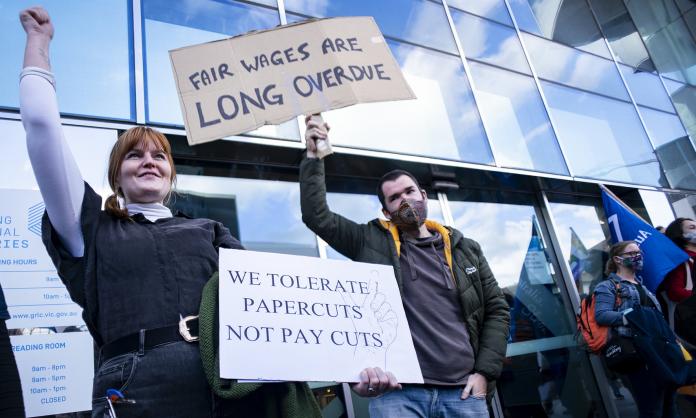Australian Services Union members at Geelong Library held a half-day stop-work on 2 July. It is the latest action in a dispute between management at Geelong Regional Library Corporation (GRLC) and library workers, who are spread over 21 different work sites, since their agreement ended a year ago.
Library workers walked off the Geelong Library site to cheers of solidarity from a crowd of community members, socialists and unionists. “This place is run like a corporation, and it shouldn’t be”, library worker and union member Beth (not their real name) told Red Flag.
Several of the striking workers show great pride in the service they provide to their community. They help put library users in touch with information, entertainment and learning resources they otherwise wouldn’t have access to. They make the library a hub for the community. “That’s what our community wants us to be. That’s what a public library should be”, explains Beth.
There is a common feeling among staff at the stop-work that the library executive does not listen. “We tell them what we need to run our services better, to feel safe in our workplace, and they just act like they know our jobs and conditions better than we do”, says another worker. “We tell them we want car parks nearby because staff do not feel safe walking 20 minutes to their car after an evening shift. They tell us, ‘Safety is not a concern for our staff’—while they have their own car parks and leave work at 5pm!”
The fight has been building since the previous agreement lapsed in June last year. Library staff baulked at management’s initial offer of below-inflation wage rises and cuts to overtime pay. Rank and file activists began meeting regularly across the many branches to organise a campaign. Workers are demanding their pay and conditions be brought into line with other libraries, which would involve a significant pay rise and improvements to conditions.
The CEO of GRLC resigned in March, midway through negotiations for a new agreement. Staff at the stop-work speculate this was because management thought she was not sufficiently forceful against an unexpectedly combative workforce.
The workers organised the first protected action ballot that anyone can remember at GRLC, which ended in May with resounding support for industrial action. The turnout was high, and nearly 80 percent voted to take action. To test the waters, less disruptive actions were planned to kick off on 20 May, with staff wearing badges with union demands and handing out flyers to library patrons to present their claims. But at the first sniff of the proposed action, management resorted to intimidation, introducing absurdly detailed new time sheets and threatening that staff would be docked pay for every second they spent distributing leaflets.
Staff were not cowed. In fact, they received a boost in confidence from the overwhelming support they received from library users while handing out leaflets to publicise their campaign. A mood to escalate industrial action began to spread. In early June, workers resolved to use the library’s public address system to make pro-union announcements and to waive overdue fines. Management announced that anyone using the public address system would be sacked! To disrupt the fine waiver action, management shut down the entire fine payment system —which also prevented patrons from borrowing items or accessing electronic resources.
The workers’ view of management has changed over the past year as a result of the dispute. “Librarians serve the community”, said one worker at the rally. “I used to think the library itself was a community: nice, progressive, managers and staff who all get along to serve the community together. But with these negotiations, management are just being bullies. They don’t care about us, and they don’t care about providing a good service to the community. They just want to cut costs.”
Workers have indicated that if management doesn’t agree to their demands, they are prepared to take further action.








